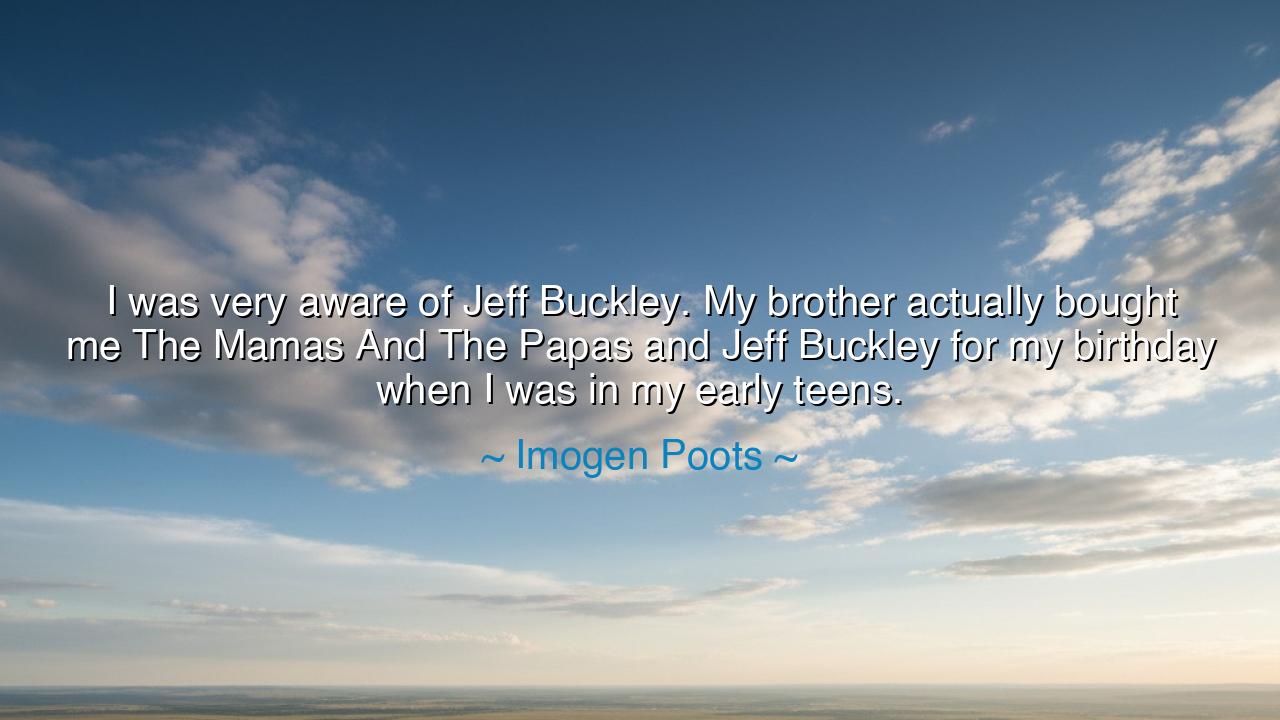
I was very aware of Jeff Buckley. My brother actually bought me
I was very aware of Jeff Buckley. My brother actually bought me The Mamas And The Papas and Jeff Buckley for my birthday when I was in my early teens.






Host: The afternoon sun drifted low over the city skyline, brushing the windows of a small record store with honey-colored light. The air smelled of dust, vinyl, and faint nostalgia — that quiet ache that lives inside music. Jack stood by a cracked speaker, flipping through old records, his fingers grazing the worn covers like they were pages of a forgotten diary. Across from him, Jeeny sat on the floor, surrounded by open albums, tracing the grooves on a Jeff Buckley vinyl with reverent fingers.
A faint hum of “Grace” played from an old turntable. The voice was fragile, pure, almost divine. It filled the room like light through stained glass.
Jeeny: “Imogen Poots once said her brother gave her The Mamas and The Papas and Jeff Buckley for her birthday when she was a teen. Funny how some gifts stay inside you forever, like they plant something in your soul.”
Host: Her eyes glimmered with memory, reflecting the vinyl’s shimmer. Jack smirked, half amused, half wistful, the corners of his mouth twitching under the weight of something unspoken.
Jack: “Or maybe they just make you sentimental. We attach too much meaning to sound sometimes. It’s just vibrations, Jeeny — air moving in patterns.”
Jeeny: “Air moving in patterns that made you feel something, though. You can’t tell me you’ve never had a song tear something open in you.”
Jack: “Sure. But that’s chemistry, not divinity. Music tricks your brain into releasing dopamine. It’s a well-engineered illusion.”
Host: The light shifted through the dust, golden flecks swirling like tiny ghosts. A train rumbled somewhere far away — distant but rhythmic, like a second heartbeat. Jeeny tilted her head, her hair spilling across her shoulder, her voice quiet but firm.
Jeeny: “You always strip beauty down to biology. Can’t you just let something be mysterious?”
Jack: “Mystery’s fine, as long as we know it’s fiction. You want to believe a song changes you. I say it just reminds you of what was already there.”
Jeeny: “But that’s exactly the point, Jack. Music doesn’t add something to you — it reveals you. Buckley didn’t sing to make people feel; he sang what they already felt but didn’t know how to say.”
Host: Jack lifted a record — “Dream a Little Dream of Me” by The Mamas and The Papas. The cover was faded, the edges frayed. He studied the faces frozen in their sixties glow, then set it gently on the turntable beside Buckley’s album.
Jack: “So what — these are your prophets now? Buckley, The Mamas, Lennon, Cohen? People canonize singers like saints because they can’t stand their own silence.”
Jeeny: “Maybe silence is what their voices make sacred. Maybe we need them because they remind us that being human is... noisy and fragile and beautiful all at once. Think about Buckley — he drowned young, chasing beauty right into the river. You call that illusion? I call it devotion.”
Host: The needle dropped. The song began — “Dream a little dream of me” — slow, sweet, slightly off-key from age. The record crackled like a soft fire. Jack’s expression softened, almost imperceptibly.
Jack: “Devotion can be a form of madness. Buckley died because he believed in something too much — maybe even his own myth. That’s the danger of worshipping art.”
Jeeny: “Or maybe it’s the price of living honestly. He didn’t want to survive the world — he wanted to feel it completely. You’d call that foolish; I’d call it courage.”
Host: A beam of sunlight touched Jeeny’s cheek, illuminating the faint freckles, the glint of sincerity in her eyes. Jack leaned against the wall, his voice quieter now.
Jack: “You think feeling everything is noble? It’s exhausting. The people who survive are the ones who can turn down the volume. If you feel too much, you burn out.”
Jeeny: “Then maybe burning out is better than fading into numbness. Why do you think Imogen remembered that gift? Because it was more than music — it was a seed. Someone told her, ‘Here, listen — this is how the heart sounds before the world hardens it.’”
Host: Outside, a car horn blared — the world breaking through the sanctum of their reflection. Jack rubbed his temple, eyes distant, his grey irises catching the reflection of the spinning vinyl.
Jack: “You talk like every song is scripture. But songs fade. People move on. The past becomes noise.”
Jeeny: “No. The past becomes harmony. Every song you ever loved hums somewhere inside you. That’s how memory works. It’s not gone — it’s tuned into your pulse.”
Host: Jeeny leaned forward, her voice low, confessional.
Jeeny: “When I was sixteen, I used to sit on my roof at night, headphones on, listening to ‘Hallelujah’. Buckley’s version. Every note felt like it was made out of broken glass and mercy. I thought, if this voice exists in the world, maybe I’m not completely alone.”
Jack: “And did it fix anything?”
Jeeny: “No. But it made the pain beautiful. That’s enough.”
Host: Jack was silent. He looked down, tracing the rim of his glass. The sunlight faded; the store was slowly swallowed by the soft blue of dusk. The record crackled to its end, the needle spinning in the center groove — a circular sigh.
Jack: “You know... when I was fourteen, my brother gave me a Led Zeppelin album.






AAdministratorAdministrator
Welcome, honored guests. Please leave a comment, we will respond soon